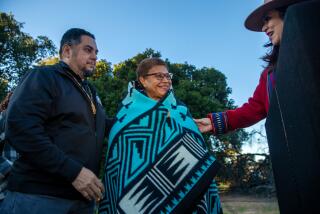NAACP Picks Retired Verizon Executive as New Leader
- Share via
ATLANTA — For the first time in decades, the NAACP on Saturday named a business executive -- not a minister, political figure or grass-roots activist -- as its leader.
Bruce S. Gordon, former president of retail markets at Verizon Communications, said that under his leadership, the NAACP would increase its emphasis on entrepreneurial growth and economic justice in the black community.
He also said the venerable civil rights organization should transcend partisan politics and build its ties with the Bush White House. “Our organization needs to have a relationship on both sides of the aisle,” said Gordon, 59. “We have a very polarized country, and I don’t like that.”
Gordon becomes president and chief executive of the National Assn. for the Advancement of Colored People at a sensitive time. Bush has refused four invitations to speak at the organization’s summer convention, the first president since Herbert Hoover to do so.
In November, the Internal Revenue Service began an investigation of the NAACP’s taxexempt status as a nonpartisan organization after authorities said board Chairman Julian Bond had crossed the line in a speech criticizing Bush policies and the Iraq war.
Gordon’s predecessor, former Maryland congressman Kweisi Mfume, resigned the same month, shortly before public allegations that he engaged in favoritism. Mfume had led the organization for nine years, and soon afterward announced a run as a Democratic U.S. Senate candidate in Maryland.
As the NAACP began a search for a new leader -- winnowing down a field of 254 applicants -- critics said the group risked losing its relevance, especially to young people.
At its meeting Saturday, the NAACP board of directors formally selected Gordon, who will become president in July after completing contract negotiations. The choice of Gordon, observers said, could engage a generation of young African Americans who see entrepreneurship as a central goal.
“There are a lot of African Americans who admire black businessmen more than they admire athletes and rappers,” said David Bositis, a political analyst at the Joint Center for Political and Economic Studies in Washington. “African Americans who are good at it become like stars. The opportunity structure is greater now, which permits more people to have higher aspirations in that area.”
Gordon spent 35 years at Verizon, beginning as a management trainee and finishing as president of retail markets. When he left the company, Gordon oversaw a business unit that employed 34,000 people and recorded $25 billion in sales. In 2002, Fortune magazine ranked him the sixth most powerful black executive in America.
Still, his name remained unknown within activist circles, said Ron Daniels, executive director of the New York-based Center for Constitutional Rights.
“The fact that I don’t know him causes me some pause,” Daniels said. “I think the verdict is still very much out. Right now, I think black America faces some of the most serious challenges in the last half-century. This is a moment when you want someone who is going to be a champion.”
Founded in 1909 by a multiracial group of activists, the 500,000-member NAACP has long served as the nation’s leading civil rights organization, monitoring equal opportunity laws and conducting voter mobilization drives. It is governed by a 64-member board of directors, headed by Bond. The last business figure to serve as leader of the NAACP was Walter White, an Atlanta insurance executive, who served from 1931 to 1955.
As its president, Gordon will be the official spokesman for the organization.
Gordon said Saturday that he was raised by activist parents -- his father was the founder of the Camden, N.J., branch of the NAACP -- but that he chose as a young man to push for change from within powerful organizations. At Verizon, he founded a networking program to help African American executives advance within the company, and participated in the Executive Leadership Council, a nonprofit working for black representation in corporate America.
“I get a little sensitive if someone implies to me that I wasn’t doing anything,” Gordon said. “If my parents’ generation went through all they did -- up to and including sacrificing their lives -- if no one went through those doors, their efforts would have been in vain. I think I did exactly what they dreamed I would do.”
Gordon said that he was a registered Democrat, but that he had contributed to campaigns of both Democratic and Republican candidates. He praised the Bush administration for putting resources behind AIDS treatment and implementing the No Child Left Behind Act. He gave no comment on the war in Iraq, saying his “feelings are not relevant to this mission.” But he added one proviso:
“I believe in inclusion,” Gordon said. “I believe in respect for all God’s children. I think that we as a country have not been ... sensitive or considerate of the people we are at war with.”
After Gordon’s news conference, Nicholas Wiggins, a member of the NAACP’s youth council, said Gordon was “a figure young people can relate to.” Wiggins, 23, said his peers cared deeply about economic security and employment.
“The old image is marching through the streets with Martin Luther King,” Wiggins said. “The new image is making sure that the African American community and communities of color are represented in the boardroom.”
More to Read
Inside the business of entertainment
The Wide Shot brings you news, analysis and insights on everything from streaming wars to production — and what it all means for the future.
You may occasionally receive promotional content from the Los Angeles Times.









